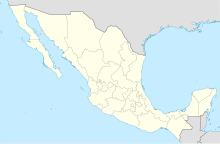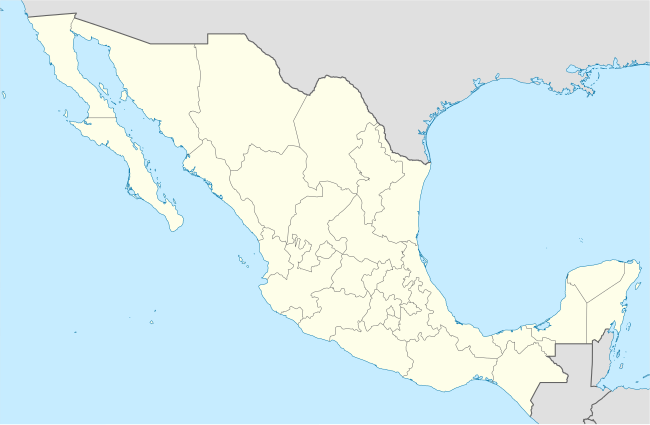Mérida International Airport
Mérida International Airport Aeropuerto Internacional de Mérida | |||||||||||||||
|---|---|---|---|---|---|---|---|---|---|---|---|---|---|---|---|
 | |||||||||||||||
| Summary | |||||||||||||||
| Airport type | Military/Public | ||||||||||||||
| Owner/Operator | Grupo Aeroportuario del Sureste | ||||||||||||||
| Serves | Mérida, Yucatán, Mexico | ||||||||||||||
| Built | 1929 | ||||||||||||||
| Time zone | CST (UTC-06:00) | ||||||||||||||
| Elevation AMSL | 12 m / 39 ft | ||||||||||||||
| Coordinates | 20°56′13″N 089°39′28″W / 20.93694°N 89.65778°W | ||||||||||||||
| Website | www | ||||||||||||||
| Maps | |||||||||||||||
 | |||||||||||||||
 | |||||||||||||||
| Runways | |||||||||||||||
| |||||||||||||||
| Statistics (2023) | |||||||||||||||
| |||||||||||||||
Source: Grupo Aeroportuario del Sureste[1] | |||||||||||||||
Mérida International Airport (Spanish: Aeropuerto Internacional de Mérida), officially Aeropuerto Internacional Manuel Crescencio Rejón (Manuel Crescencio Rejón International Airport) (IATA: MID, ICAO: MMMD), is an international airport located in the Mexican city of Mérida. It serves as the primary international gateway to Mérida and the State of Yucatán, a popular tourist destination, offering flights to and from Mexico, the United States, Canada, Central America, and the Caribbean. The airport also accommodates facilities for the Mexican Airspace Navigation Services, and the Mexican Army, and supports various tourism, flight training, and general aviation activities. Additionally, it serves as a focus city for Viva.
The airport is named in honor of the jurist and politician Manuel Crescencio García Rejón, who was originally from Yucatán. It is operated by the Grupo Aeroportuario del Sureste (ASUR).[2] The airport has become one of the fastest-growing airports in the country. In 2022, it handled 3,079,618 passengers, surpassing three million passengers in a calendar year for the first time; and in 2023, the number increased to 3,674,103 passengers.[1] It also ranked as the eighth-busiest airport in terms of passengers and aircraft movements, and tenth for cargo.[3]
History
[edit]












The airport's history traces back to its inauguration in 1929 when Mexicana de Aviación introduced the Mérida-Campeche-Ciudad del Carmen-Minatitlán-Veracruz-Mexico City route, operated with a Ford Trimotor aircraft. In 1964, Mexicana de Aviación sold the airport to the Mexican government. A significant reconstruction of the airport was completed in 1968, replacing the previous facilities. During the 1960s, American Airlines provided service to the airport, making it one of the few airports, apart from Mexico City and Acapulco, to be served by a major airline.
During the 1990s, the airport became part of the Grupo Aeroportuario del Sureste, marking an important instance of a private concession within this group. This consortium encompasses various airports, including Cancún, Cozumel, Huatulco, Mérida, Minatitlán, Oaxaca, Tapachula, Villahermosa, and Veracruz. Throughout the years, it underwent several modifications and modernizations, notably in 1999, 2011, and 2021. The airport has welcomed distinguished political and religious figures, such as Pope John Paul II, as well as U.S. Presidents Bill Clinton and George W. Bush, and President of China, Xi Jinping.
Throughout its history, the airport has been serviced by a range of airlines, including Aero California, Aeromar, Aviateca, Blue Panorama Airlines, Cubana, Delta, Interjet, Mexicana, Neos, Pan Am, Lufthansa, TAR, and Tropic Air. From 1972 to 2005, it functioned as the primary hub for Aerocaribe and Aerocozumel, both subsidiaries of the former Mexicana. Between 1992 and 1995 it served as a hub for Aviacsa, and more recently, it was home to the regional airline Mayair.[4]
Facilities
[edit]The airport is situated in the Mérida urban area, less than 5 kilometres (3.1 mi) southwest of the city centre, at an elevation of 12 metres (39 ft) above sea level. It features two runways: Runway 10/28, which is 3,200 metres (10,500 ft) long, and Runway 18/36, which spans 2,300 metres (7,500 ft). Adjacent to the terminal, there is a commercial aviation apron capable of accommodating up to 11 narrow-body aircraft or a combination of 3 narrow-body and 3 wide-body aircraft. Additionally, a remote stand is available for 2 narrow-body aircraft. The airport has the capacity to service airplanes as large as Boeing 747s and 777s, although most daily flights involve smaller aircraft, with the most common being the Boeing 737 and Airbus A320. The airport can handle up to 30 operations per hour and operates around the clock.[5]
Passenger terminal
[edit]The passenger terminal is a two-story structure. The ground floor comprises the main entrance, a check-in area, and the arrivals section, which includes customs and immigration facilities, along with baggage claim services. Additionally, car rental services, taxi stands, snack bars, and souvenir shops are available. The upper terminal floor hosts a security checkpoint and departure area, featuring a 260 metres (850 ft) long departures concourse. Within this section, there are restaurants, food stands, duty-free shops, VIP lounges, and eleven gates (C1-11), with seven of them equipped with jet bridges.[6][7]
In the vicinity of the terminal, various facilities are located, including civil aviation hangars, cargo and logistics companies, and cargo services. There is also a dedicated general aviation terminal that supports a range of activities, such as tourism, flight training, executive aviation, and general aviation.
Other facilities
[edit]The airport is home to the Mérida Area Control Center (ACC), one of four such centers in Mexico, alongside the Mexico City ACC, Monterrey ACC, and Mazatlán ACC.[8] Operated by the Mexican Airspace Navigation Services (Spanish: Servicios a la Navegación en el Espacio Aéreo Mexicano), Mérida ACC provides air traffic control services for aircraft operating within the Mérida Flight Data Region (FDRG), which encompasses the southeastern region of Mexico. This region shares its boundaries with six other Area Control Centers. To the west, it borders the Monterrey ACC and Mexico ACC, while to the north, it shares borders with the Houston ARTCC (KZHU), and to the east and south, it connects with the Havana ACC (MUFH) and the Central American ACC (MHTG), respectively.[9][10]
Air Force Base No. 8 (Spanish: Base Aérea Militar No. 8 Mérida, Yucatán) (BAM-8) is located on the airport grounds, north of Runway 10/28. It serves as the home for Air Squadron 114, responsible for operating Cessna 182 aircraft. BAM-8 features two aprons, one spanning 11,775 square metres (126,750 sq ft) and another covering 4,000 square metres (43,000 sq ft). In addition to these, it includes three hangars and various other facilities for accommodating Air Force personnel.[11]
Airlines and destinations
[edit]Passenger
[edit]^1 Viva flight to Tijuana makes a stopover in León/El Bajío.
Cargo
[edit]Destinations map
[edit]Statistics
[edit]Graphs are unavailable due to technical issues. Updates on reimplementing the Graph extension, which will be known as the Chart extension, can be found on Phabricator and on MediaWiki.org. |
Busiest routes
[edit]| Rank | City | Passengers | Ranking | Airline |
|---|---|---|---|---|
| 1 | 944,674 | Aeroméxico, Aeroméxico Connect, Magni, Viva Aerobus, Volaris | ||
| 2 | 188,600 | Viva Aerobus, Volaris | ||
| 3 | 175,928 | Viva Aerobus, Volaris | ||
| 4 | 90,226 | Aeroméxico Connect, Volaris | ||
| 5 | 60,035 | Viva Aerobus | ||
| 6 | 53,444 | Viva Aerobus | ||
| 7 | 35,061 | Viva Aerobus | ||
| 8 | 13,207 | Viva Aerobus, Volaris | ||
| 9 | 32,446 | Volaris | ||
| 10 | 21,057 | Viva Aerobus |
| Rank | City | Passengers | Ranking | Airline |
|---|---|---|---|---|
| 1 | 47,533 | United Airlines | ||
| 2 | 37,896 | American Eagle | ||
| 3 | 22,614 | American Eagle | ||
| 4 | 6,985 | Viva Aerobus | ||
| 5 | 3,455 | WestJet | ||
| 6 | 3,449 | TAG Airlines | ||
| 7 | 1,656 | Viva Aerobus | ||
| 8 | 1,656 | Viva Aerobus | ||
| 9 | 137 | TAG Airlines |
Accidents and incidents
[edit]- On 9 April 1958, a Vickers Viscount of Cubana de Aviación was hijacked en route from José Martí International Airport, Havana, to Santa Clara Airport. The aircraft landed at Mérida-Rejón Airport, Mexico, where the hijack ended.[15]
- On 1 June 2023, an Aeromexico Boeing 737-8JP declared a Squawk 7700, a regulation for emergency on an aircraft. While en route to Mexico City, the aircraft, registered XA-PPP diverted back to Merida International Airport. The aircraft suffered an engine loss and safely landed with no deaths to the people on board.
See also
[edit]- List of the busiest airports in Mexico
- List of airports in Mexico
- List of airports by ICAO code: M
- List of busiest airports in North America
- List of the busiest airports in Latin America
- Transportation in Mexico
- Tourism in Mexico
- Grupo Aeroportuario Centro Norte
- Area control center
- List of area control centers
- Flight information region
- List of Mexican military installations
- Mexican Air Force
References
[edit]- ^ a b "Passenger's Traffic" (in Spanish). ASUR. Retrieved 26 January 2024.
- ^ "Our airports".
- ^ "Estadística Operacional de Aeropuertos / Statistics by Airport". Agencia Federal de Aviación Civil. Retrieved 26 January 2024.
- ^ Aviacsa History
- ^ "MID airport information".
- ^ "Salones Premier".
- ^ "Caral lounge".
- ^ "Air Traffic Control Services".
- ^ "ATFM Regional Implementation Progress in the CAR Region" (PDF).
- ^ "Seminario/taller CAR/SAM para la implantación de sistemas avanzados de vigilancia y automatización" (PDF).
- ^ "Bases Aéreas. Secretaría de la Defensa Nacional".
- ^ a b "New Destinations from Mérida". Viva Aerobus (in Spanish). October 2023. Retrieved 2 October 2023.
- ^ a b "Viva Aerobus adds 2 new routes from Mérida". Mexico News Daily. 26 June 2024. Retrieved 6 July 2024.
- ^ a b "Estadística operacional por origen-destino / Traffic Statistics by City Pairs" (in Spanish). Agencia Federal de Aviación Civil. January 2024. Retrieved 30 January 2024.
- ^ "Accident description". Aviation Safety Network. Retrieved 8 September 2009.
External links
[edit] Media related to Manuel Crescencio Rejón International Airport at Wikimedia Commons
Media related to Manuel Crescencio Rejón International Airport at Wikimedia Commons- Official Website
- Grupo Aeroportuario del Sureste
- Merida International Airport
- Aeronautical chart and airport information for MMMD at SkyVector
- Current weather for MMMD at NOAA/NWS
- Mérida Airport information at Great Circle Mapper
- Accident history for MID at Aviation Safety Network
- Mexican Air Traffic Control Services
- Servicios a la Navegación en el Espacio Aéreo Mexicano




